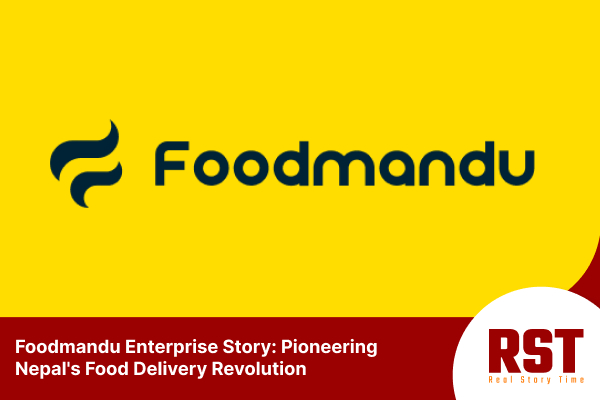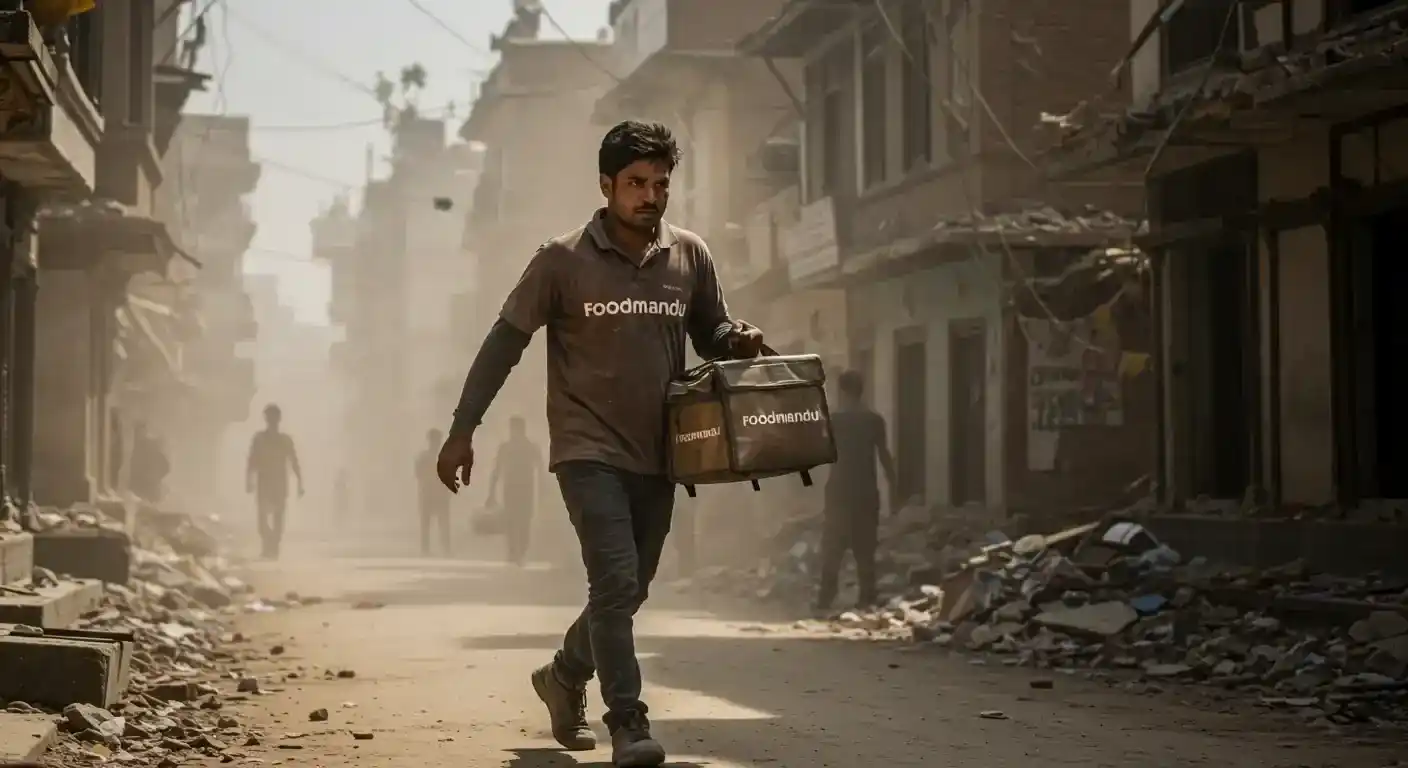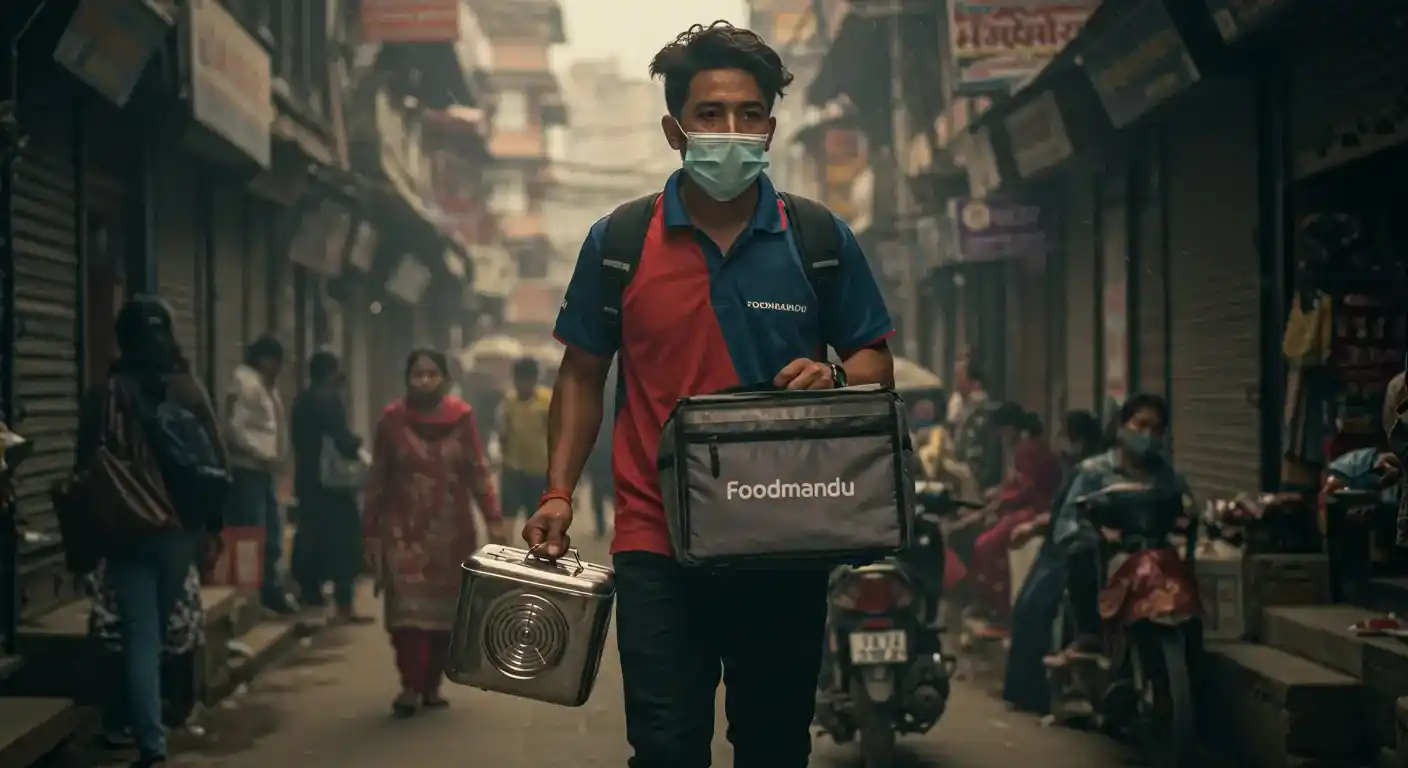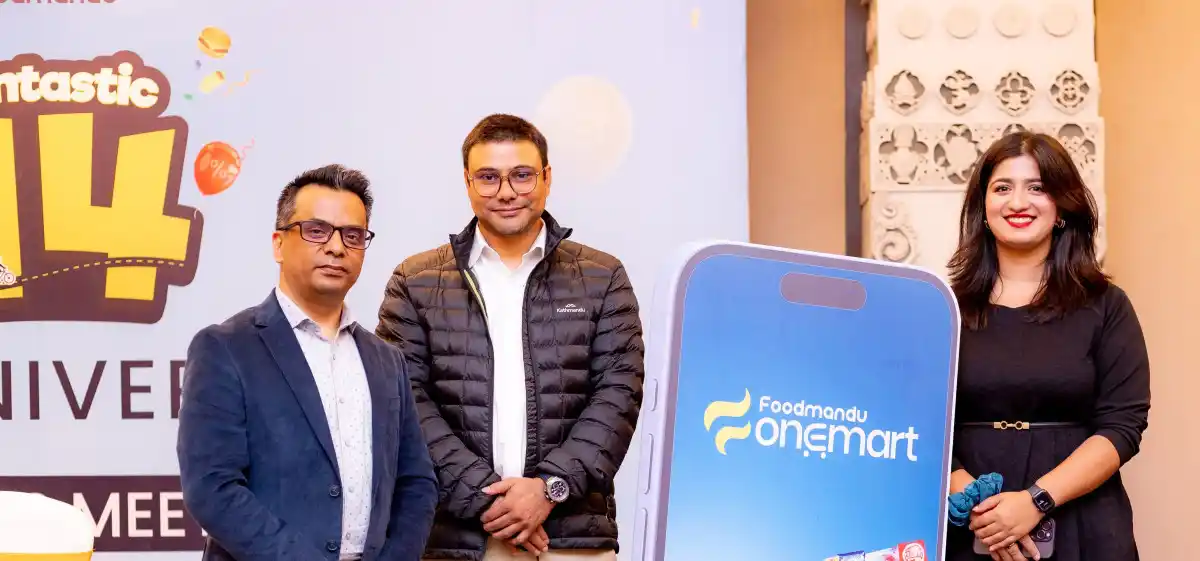Foodmandu Enterprise Story: Pioneering Nepal’s Food Delivery Revolution
By Kushal Shrestha - Apr 1, 2025 | Updated: April 1, 2025 | 19 min read

Foodmandu didn’t simply arrive in Nepal; it blasted like a plate of freshly made momo into the hearts (and stomachs) of Kathmandu’s hungry masses.
Imagine a young Manohar Adhikari, a software developer who loves a good meal, gazing at his lunch tray back in 2010. The same old dal bhat again? The same crowded streets to navigate to get there to have a decent meal? “There has to be a better way,” he thought, his stomach growling in agreement.
Thus, Foodmandu was born not simply as a food delivery service but as a protest against culinary boredom. The first few days were a spicy combination of trial and tribulation. Manohar drove his motorcycle to the narrow roads of Kathmandu, persuading restaurant owners that this “online ordering” just might work. Most laughed; some listened.
The breakthrough arrived like monsoon showers after a dry spell. When smartphones became more common in Nepal, the Foodmandu app suddenly worked for everybody. Rather than five orders daily, the platform processes thousands, connecting more than 800 restaurants throughout Nepal’s major cities.
The story of Foodmandu is more than food; it is about resilience. When earthquakes shook the nation in 2015, its delivery network became a lifeline by getting supplies into areas isolated by the disaster. Foodmandu was a beacon of hope in the darkest days, bringing more than food.
These days, Foodmandu is in a state of evolution, venturing into grocery delivery and rapid essentials. They’re not just feeding Nepal; they’re transforming it and how an entire nation enjoys convenience, technology, and the simple pleasure of a well-deserved meal.
So, the next time you use the Foodmandu app, remember: You are not just ordering food but rather joining a food revolution that started with one man and his need for good food and honest work.
Foodmandu: From Frustration to Food Revolution
A Hungry Mind at Work
Around the beginning of the 2000s, Manohar Adhikari worked at the US-based software company D2Hawkeye in Kathmandu. Bishalnagar, where his office is, was busy but had one major drawback: good restaurants.
When lunchtime arrived every working day, Manohar and his coworkers had to decide between two choices: eat at the nearby restricted menu or take a longer walk to find better options. Work pressure overwhelmed their mental state so much that mealtime shrunk to distant regions of their thoughts.
He spent his time at his desk with a rumbling stomach and intensifying frustration when suddenly, a thought emerged about receiving food delivery service within the office premises.
It wasn’t just a passing thought. Over time, that simple frustration would evolve into an idea that would change the food landscape in Nepal forever.
A Vision Takes Shape
In his area of technology expertise, Manohar investigated how global markets were developing their food delivery offerings. Restaurant customers can now receive meal deliveries directly from Grubhub in America and Swiggy in India through doorstep delivery services.
Based on this discovery, Manohar concluded that delivery services would have potential in Nepal. An idea emerged from his mind about potential food delivery implementation in Nepal.
Food delivery services did not exist in the country during that period. Restaurant customers and phone-based customers were the only ordering options until now. Despite being uncommon at that time, people found the idea of online shopping challenging to grasp.
But Manohar saw potential.
He understood the potential to create a platform to unite consumers with restaurant food delivery services, thus transforming how people eat out.
As he considered it more, he felt strongly that this idea had to be realized. He resolved to see it through no matter what challenges he faced. Changing how people engage with food only became a more enticing proposition that could not be ignored.
The Birth of Foodmandu
Manohar took his chance in November 2010 to establish Foodmandu. When the industry concept emerged, it represented a groundbreaking idea: an online connection point between customers and nearby restaurants with their food delivery options. The novel concept stunned Nepalese society because it was new to their region.
The early days were humble. When Foodmandu started operating, it partnered with 10 restaurants and employed only four employees. Manohar personally delivered his ideas about unseen food ordering to restaurant owners, who remained doubtful about the idea. Customers shared the same level of unfamiliarity about the service, making establishing trust difficult for Foodmandu.
Challenges and Doubts in the Early Stages
The first hurdle arose when restaurant owners expressed understandable doubts about the service. They expressed doubt because third-party delivery services were entirely new to them. Restaurant owners also showed hesitation because they worried that their existing business schemes would face possible disruption and that customers might choose not to place orders through new online platforms. Manohar encountered denials from his initial approach to restaurant owners.
“Why would people order online when they can just come to the restaurant?” they asked.
Despite all difficulties, Manohar continued forward. He dedicated his time to working with only those restaurants that could try new things. The company ensured that Foodmandu would handle the delivery needs of these establishments while asking restaurateurs to concentrate on their culinary expertise.
Despite achieving initial success, a significant challenge emerged.
Foodmandu struggled to attract customers. During its initial year of operation, it received an average of five daily orders. The low number of daily orders during the first year failed to provide sustainable operations for the business, which maintained a continuous loss. Maintaining business operations proved difficult as the company was pressured to increase its growth.
The search for delivery personnel presented itself as a significant challenge. Nepal lacked a formal food delivery workforce structure, and people found motivating them to become delivery riders challenging. The promising opportunity failed to attract many people because they viewed the position as unstable and uncertain about the business’s longevity.
The survival of Foodmandu created doubt since it appeared uncertain whether the business would survive. Manohar showed unwavering determination because he would not stop trying. He continued, believing he could save Foodmandu if he convinced more customers to try the service.
The situation began to change.
Winning Over Nepalese Consumers
Manohar worked to establish trust by delivering dependable service to customers. Fast deliveries, cash-on-delivery service, and top-tier customer care were essential to Foodmandu’s initial development.
Over time, word spread.
The new service attracted its initial users because they found it convenient. Customers began to discuss their favorable experiences with their circle of contacts, which resulted in Foodmandu’s market growth.
Manohar and his team rapidly acquired valuable lessons. As the customer base enlarged, the responsibility for food delivery increased to maintain the required timeliness and preserve food quality. Foodmandu achieved early success because it established a reputation for trustworthiness, which attracted increasing numbers of customers to try the service.
What was once thought impossible slowly started becoming a reality. It was still not smooth sailing; however, Foodmandu had finally begun taking its first steps toward becoming Nepal’s leading food delivery establishment.
Foodmandu: Delivering Hope During Nepal’s Earthquake Crisis

On April 25th, 2015, at 11:56 a.m., a disaster occurred when a 7.8-magnitude earthquake hit Kathmandu, causing massive building collapses and severing many roads. The city descended straight into total disorder after the earthquake since many people died while numerous families had to endure nights outside with no roof over their heads. The situation became panic-stricken as people who had escaped put themselves in a state of readiness for possible secondary tremors.
Foodmandu became one of the many businesses that suffered losses because of the disaster. The numerous years Foodmandu invested in building its service network were stopped due to the complete business immobility. During the disaster, every restaurant operated under closure, and roads remained inaccessible while people worried about their survival instead of valuing food delivery services.
When Manohar Adhikari, the founder of Foodmandu, reached the destruction site, he felt utterly powerless. Every street Manohar knew from childhood showed signs of destruction around him. Over time, he came to conceive a new idea. What if Foodmandu could do more than deliver food? What if it could help people survive?
A New Purpose Amid Destruction
Foodmandu became a relief network instead of continuing business operations after the earthquake. They approached their restaurant partners, who owned surplus supplies they lacked distribution methods to share with the public. Manohar and his team approached relief organizations and charities to access their delivery networks to supply food to those requiring assistance.
The reaction was massive.
As Foodmandu developed its rider network and logistics capabilities, the company established itself as a vital connection serving food between providers and victims affected by the earthquake. The company provided free humanitarian aid after providing its primary paid delivery service. This helped distribute warm meals to victims who were hungry after the disaster occurred. This assignment required more than mere skill because managing such a challenge proved unbelievably tough.
“We have become more than just a food delivery service,” Manohar reflects. “We have become part of the solution during difficult times.“
Braving the Ruins
All roads in Kathmandu were hidden behind massive rubble throughout the city. The massive debris piles obstructed main roads so completely that entrance to particular locations became infeasible. Due to the devastation, numerous densely populated regions of the city now functioned as self-made camps, where people who sought shelter slept under plastic sheeting and clustered together to stay warm.
The delivery team at Foodmandu showed no hesitation in handling the dangerous situation. Through wrecked roads and damaged buildings, they traveled by motorbike and later by foot and climbed over debris to provide food for homes hungry during the catastrophe.
The food delivery process exposed riders to moments where they delivered packages to individuals who remained in their damaged residences, witnessing the destruction of their surroundings. While passing the food packet to the older woman, she started crying. Only then did it occur to them that food delivery was a ray of hope for those affected by the tragedy.
Empowering the Nation
Foodmandu capitalized on the continuing relief work to bring additional people into the humanitarian mission. Through their platform, users can contribute to the donation of meals as a part of their initiative. The customer base transformed from utilizing Foodmandu for quick service to employing the platform for humanitarian relief.
By making a simple online payment, they could sponsor a meal for an earthquake survivor, which Foodmandu would ensure reached them. The campaign took off, sending thousands of meals to families who had lost everything.
Helping the people during the crisis brought about positive changes that affected both recipients and the company organization. Foodmandu never anticipated facing the biggest challenge of its existence by transforming from sales growth to crisis food distribution.
Rebuilding Together
As Kathmandu began its recovery from devastation, Foodmandu saw the imperative requirement to bring life back into the restaurant sector. Multiple dining institutions suffered significant financial difficulties because their building facades were damaged, and their culinary areas sustained damage alongside reduced customer presence. Many restaurants managed to reopen but found it challenging to bring in customers who feared eating at restaurants.
Foodmandu stepped in once again.
Through its platform, people can discover reopened dining establishments, and the company motivates users to place orders that would support local businesses struggling to recover. Food delivery services stayed operational to maintain restaurant business viability and supply safe food delivery to people who needed reliable meal access after rebuilding their lives.
A Business Transformed
The earthquake permanently changed Nepal and the Foodmandu business model. The company has evolved from an essential delivery service to a critical system supporting the strength and community assistance needed by Nepalese citizens. During the crisis, the company demonstrated its leadership by offering a lifeline service, which created a bridge to assist people who needed help from others who could provide it.
Following his experience, Manohar Adhikari developed enduring effects from this incident. The company has evolved from food delivery to a complete service for people through every possible means. The country’s strength underwent testing during the earthquake while demonstrating how unity and compassion can activate national power. Foodmandu kindly delivered hope through its meal services to Nepalese citizens when the country needed assistance most.
Foodmandu: Scaling Up and Overcoming Growing Pains
Foodmandu was launched in 2010 under the direction of Manohar Adhikari to deliver gourmet food throughout Kathmandu to satisfy its population. The company’s initial operations started with ten restaurant partners and a few employees. According to Manohar, they went through days when they failed to receive orders. The concept gave Manohar Adhikari faith that it would transform the food delivery market, yet he stayed committed to making his vision a reality.
True North Associates invested in Foodmandu in 2016, remaking the entire business situation. The crucial investment funds enabled the company to reach new market scales, increase its restaurant footprint, and deliver better infrastructure for delivery services. The rising number of Nepalese smartphone users made the Foodmandu app practical, and orders began to rise.
But growth brought new challenges. During peak hours, the traffic congestion in Kathmandu became a barrier, making quick deliveries hard. Foodmandu developed optimized delivery routes with complex algorithms and built a trained GPS-tracked staff to handle its deliveries. Foodmandu implemented real-time tracking features to let customers view their order status, eliminating delivery time-related customer concerns.
In 2020, Team Ventures supplied new funds, allowing Foodmandu to add grocery items and beverages to its services. Through these product expansions, Foodmandu adapted well to the COVID-19 pandemic by offering essential item delivery services to consumers.
Foodmandu received a third investment of USD 4 million (NPR 46 Cr) through the Dolma Impact Fund in 2023. The financial support enabled the company to execute new service growth, expand its territories, and develop superior technology and staff systems.
Foodmandu has established itself as Nepal’s leading food delivery platform, handling orders daily and having 800+ restaurant partners. The business idea developed by Manohar achieved commercial success, which caused startup development and nationwide changes in how people acquire their meals in Nepal. Foodmandu advances its operations while upholding its promise to deliver premium convenience service to all its customers.
READ MORE: An Enterprise Story of PayPal: Revolutionizing Digital Payments Worldwide
The Little Packages That Kept Nepal Going: Foodmandu’s Journey During the Pandemic

The worldwide suspension in early 2020 affected Nepal and other parts of the world. The pandemic caused both streets to empty, businesses to close their shutters, and typical city sounds to disappear. The locked-down city still received small hope packages that Foodmandu distributed during the chaos.
A Beacon of Hope in Times of Need
Foodmandu has long been a Nepalese household brand and now delivers restaurant meals throughout Nepal. The COVID-19 pandemic required Foodmandu to serve more than ease of use since it enabled people to survive. Family members established Foodmandu as their source of fresh food, dairy, and essential items after supermarkets transformed into dangerous areas with unstable supply networks.
When the crisis started, Foodmandu Fresh emerged as a new service. It partnered with six local vendors to manage essential supply operations. The organization transformed its primary offering from food delivery to becoming a vital link that enables Nepalese customers to connect with struggling companies during financial challenges.
A Difficult Decision
The transition brought severe losses to the organization. A profitable enterprise that used to employ 150 delivery personnel went into sudden decline. The reduced number of orders and movement restrictions allowed no more than 30 to 40 riders to work each shift. The rest of the personnel received unpaid leave, creating a weighty burden for those leading the company.
Due to the pandemic, Rupen Gurung worked as a delivery rider and became one of the few employees who still operated. “It’s hard,” he admitted. “But I’m grateful. Through food delivery services, I assist the community while providing financial aid to my parents.
Uncertainty overshadowed the work situation for most of his colleagues. A few employees remained, expecting a work call-back, while others had to find new sources of income.
Embracing the Unknown
Foodmandu founder Manohar Adhikari predicted that the upcoming obstacles would prove extremely challenging to surmount. The company’s fast adaptations proved insufficient to secure success since consumer behavior shifted in unpredictable patterns.
He thought that nobody could predict what the following day would hold. The situation forced us to modify our approach, but we understood we needed to continue ahead.
The company continued to operate during uncertain times by delivering food and financial stability to its customers. Every Foodmandu order provides a hot meal and financial stability, helping customers keep their restaurant suppliers’ and drivers’ earning capacity.
A story of resilience and determination
Foodmandu survived to become a symbol of endurance as Nepal came out from its lockdown restrictions and established its commercial sector. All riders who worked through the deserted streets joined with vendors who kept inventory stocked and customers who placed their faith in them to form this collective experience.
The little packages they delivered weren’t just groceries. They were hope, survival, and the promise of better days ahead.
14 Years of Magic: Foodmandu Launches One Mart to Transform Daily Shopping
In the center of Kathmandu, where spicy noodle aromas infuse the air and the chatter of bustling streets fills the atmosphere, Foodmandu has celebrated its existence for 14 wonderful years. After starting as a pioneering food delivery platform in Nepal, it has transformed into a popular household name, delivering food with moments of joy and memories shared in different houses around the city.
Foodmandu is beginning a new journey of changing households across Nepal on its 14th anniversary in 2024. The initiative aims to convert every meal into an experience, establish the community outside the home, and encourage families to meet up, share stories, and create memories that last forever. Foodmandu introduced Nepal’s first food delivery service, and the company’s birth brought both food delivery and moments of happiness to customers. Today, it is determined to create an energized community, one meal at a time.

The idea was inception in an office with a small wall, with Foodmandu founder Manohar Adhikari brainstorming with his team on evolving with their customers’ needs. “We have delivered millions of meals,” he said, “but what if we could deliver everything that enabled a meal?” There was a moment of silence; then everybody burst into excitement. What if one could deliver groceries to people’s doorsteps within the same time it delivers pizzas? The Foodmandu One Mart concept emerged.
The team committed themselves to months of nonstop work to achieve flawless results. The company prepared a selection of more than 700 essential goods from their reliable supply network, including fresh vegetables, dairy items, snacks, and household supplies. At first, the team defined delivery zones starting with Gairidhara, covering areas such as Maharajgunj, Dhumbarahi, Baluwatar, and Maitidevi in Kathmandu within a 3 km radius before extending their service to Lalitpur. The service included a smooth application experience, which enabled users to access it through simple touch commands.
The office showed extreme enthusiasm when Foodmandu celebrated its 14th anniversary on this day. Manohar addressed the team while emphasizing that this day meant much more than service initiation because they reshaped how people access everyday necessities. The time of 7 A.M. marked the start of numerous order requests. Riders started transporting groceries through the streets within short periods while customers praised both the quick service and exceptional quality.
Founder and MD of Foodmandu, Manohar Adhikari, said, “Foodmandu has grown because of our commitment to meeting customer needs.” With Foodmandu One Mart, “we want our customers to have a more convenient experience with everyday shopping, just like the simple act of ordering their favorite meal.”
The celebrations didn’t stop there. Foodmandu launched its “Fantastic 14 Sales” promotion to offer outstanding discounts similar to presents. Foodmandu provided 70% discounts and deals in combination with its “14 Bites Platter” meal selection. The new service attracted numerous customers, who made One Mart famous in their communities.
In early 2025, One Mart expanded to Lalitpur, bringing convenience to residents of Jawalakhel and Sanepa. Customers who used to wait hours at supermarkets could now get their orders delivered within thirty minutes before dinner. The service exceeded essential delivery because it transformed into an entire life system.
The 14th anniversary of Foodmandu in this traditional city shows more than successful past achievements. Through the creation of new possibilities, every home, community, and active life will find simplified solutions. At One Mart, the magic is not in the food but in the freedom from life itself. As riders continue to weave through the streets carrying groceries, the city whispers, “This is just the beginning.”
Conclusion: Delivering the Future
Foodmandu’s shift from a startup with a risky concept to being Nepal’s most dominant food-tech enterprise is one of vision, perseverance, and adaptability. In addition, the company leveraged its leadership to capture the market and stimulate Nepal’s customer service, innovation, and digital commerce industries.
During uncertain times when people doubted the market, technology was unpredictable, natural disasters like earthquakes occurred, and the pandemic was a global emergency. Foodmandu went through a revolutionary phase, introducing more services to its customers, helping local businesses get stronger, and adopting consumerism with a different attitude. The company’s shift from restaurant orders to groceries and other consumer goods demonstrates that no business can survive without continuous reshaping to keep up with market dynamics and unexpected calamities.
Foodmandu is driving digital innovation in Nepal as the country adopts digital technology. It is one of the first companies to make a breakthrough in the three main fields: e-commerce, logistics, and other AI-driven services. Foodmandu carries and delivers a future of speed, product reliability, and technology. In other words, it has started a change, and the future that follows can be expected to be the best.
Notice an error?
Help us improve by submitting a correction.







